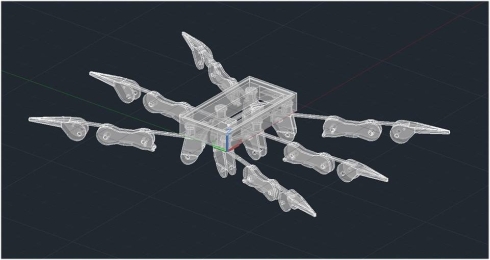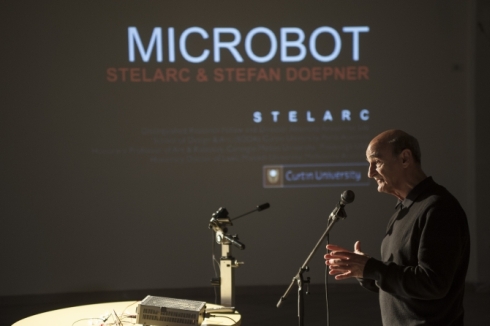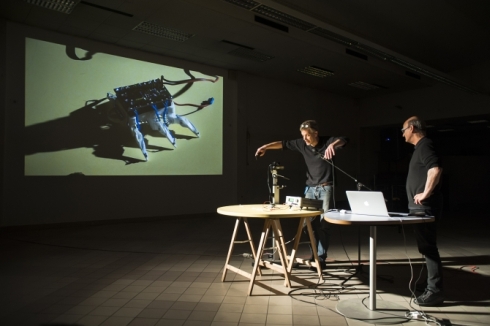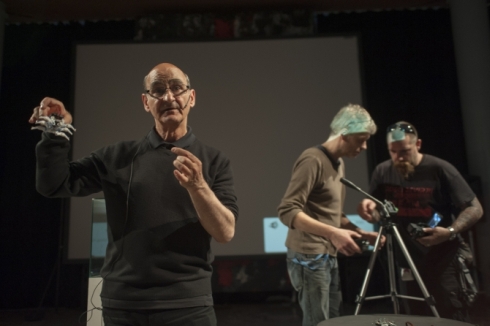Microbot
Authors: Stelarc (AU) and Stefan Doepner (DE/SI)
Microbot is a new chapter in Stelarc’s conceptualisation of obsolete body which addresses our fears, prejudices and visions regarding the extending and upgrading of the human body with the help of contemporary technology. Microbot is a robotic and performative intervention into Stelarc’s body that thematises the growing intimacy of machines and the human body, and enacts a possible future in which the body will be colonised by micro- and nano-sensors, devices and robots augmenting our bacterial and viral populations.
Due to the project’s complexity, Microbot will be carried out in two stages: in the first stage (2014), a small insect-like six-legged robot will be designed and constructed so that it can climb up Stelarc’s tongue and into his mouth. In the second stage of the project, the robot will be upgraded to perform a particular operation in Stelarc’s mouth. This will be determined on the basis of experiences with the robot in the first stage of the project’s development.

Prehistory
Microbot belongs to a series of six-legged bionic robotic platforms conceived by Stelarc and designed, constructed and realized by Stefan Doepner together with f18institut from Hamburg. In 1998, they realized Exoskeleton, a three metre diameter insect-like six-legged robot that supported the artist’s body, and in 2006, they made Walking Head, a two metre diameter six-legged autonomous and interactive platform with an avatar head displayed. If Exoskeleton enabled Stelarc to “inhabit” it and control its movement, in Walking Head, the artist’s body is absent and replaced by an avatar. In the case of Microbot, the robot will enter the artist’s body.
The initial attempt to simulate and engineer the Microbot was funded by a Special Projects Grant from the Australia Council.
Computer animation (by Steve Middleton): https://www.youtube.com/watch?v=WEiUY1Wo8uY
About authors
Stelarc uses his body as a medium and an exhibition space at the same time, while employing robotics, prostheses, medical instruments, virtual reality, the internet and biotechnology. In exploring the capability of extending and upgrading the (obsolete) human body with the help of contemporary technology, Stelarc rejects hypothetical speculations about possible futures and believes in the meaning of bodily, real experience. In other words he actualises his ideas. Starting with his suspension performances and the robotic Third Hand, and continuing through to the Stomach Sculpture, which was inserted down his oesophagus into his stomach (a machine choreography inside the body) or the Extra Ear that is surgically constructed and cell grown in his arm eventually to be internet enabled, he perceives the body as an extendible evolutionary structure amplified with the most diverse technologies.

Working in the filed of technologically based art and robotics, Stefan Doepner investigates today’s prevalent reception, use and impact of technology in our everyday lives. He reinvents various technological devices and creates autonomous systems (robots) to interrupt our automated relation to technology. The poetic and absurd items and situations that he creates show that the contemporary technology which is so atuomatically imbedded into our daily lives is something in itself obsolete. Similar like Stelarc explores the relation between human body and technology through his own experience with it, Stefan Doepner reinvents obsolete technology through the entire creative process – from making own technological tools till creating his artistic embodiments of technological visions.


_______________________________________________________________________________
Produced by the: Obrat Association; Cultural Institution Delavski dom Trbovlje
The project (Microbot functioning prototype) was presented for the first time as part of the accompanying programme of the Speculum Artium festival in Trbovlje and in Ljubljana, October 2014.
Partners: Cirkulacija 2; f18institut
The project is supported by the: Ministry of Culture of the Republic of Slovenia
Sponsored by the: Zasavje Regional Technology Centre
Technical assistance: Lars Vaupel, Dominik Mahnič
Thanks to: MGML, Bunker Institute and Fadim Fiškin
Photo by: Miha Koron
